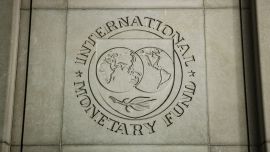The wild rollercoaster ride of the past several months, which included an acute currency crisis and the eruption of a corruption scandal that goes all the way up to Cristina Fernández de Kirchner, seems to have dissipated. To the benefit of the mental sanity of experienced Argentina watchers, the problem with the current relative calm is that it threatens to relax us at a moment when full attention and dedication is needed. Argentina’s macroeconomic distortions remain as extreme as ever, with President Mauricio Macri hoping for an extraordinary recovery in the agro-exporting sector to allow him to reach the 2019 presidential elections competitively. On the judicial front, federal Judge Claudio Bonadio has formally accused the former president of heading an illicit association along with public officials and businessmen to defraud the state in one of many circuits of public-private crime, but a sustained investigation is required to truly bring everyone to justice.
Let’s hope that the government and society don’t fall victim to the “WhatsApp syndrome.” The name comes from several research papers that have suggested smartphone use has shortened attention spans, generating a culture of multi-tasking that requires immediate gratification, hampering individuals’ capacity to engage in deep thinking and therefore completing complex tasks.
Macri’s PRO party, the central structure of the ruling Cambiemos (Let’s Change) coalition, embraces “WhatsApp politics,” betting on dumbed down communication that “reaches the heart” through social media while minimising the role of professional journalism. Led by Cabinet Chief Marcos Peña and star political advisor Jaime Duran Barba, Cambiemos forms its decisions by “listening to the people,” conducting constant surveys and focus groups in order to arrive at their final policy decisions. But through this they risk being trapped by immediacy, operating at the superficial level of the smartphone, ultimately mistaking the tree for the forest.
The Merval, Argentina’s leading stock market index, had an incredible week, gaining as much as 18 percent on at one point on Thursday before profit-taking left it up 13.8 percent for the week. An analysis of 22 predominantly Argentina-focused companies by La Nación — excluding Petrobras and Tenaris which have substantial overseas exposure — showed a US$6.3-billion collective increase in their market capitalisation. The peso strengthened against the US dollar, closing the week well below the psychologically significant 40-peso level, while Wall Street investors once again have started to snap up peso-denominated assets given attractive valuations. Central Bank President Luis “Toto” Caputo told investors the peso has found “equilibrium,” days after having reduced the stock of short-term paper known as Lebacs and successfully injected other monetary instruments in order to absorb excess pesos.
The welcome relative stability of the peso after weeks of heavy turbulence shouldn’t be mistaken with a longer-term fix of Argentina’s fundamental problems. The peso’s aggressive correction has undoubtedly done part of the dirty work for Macri, severely limiting imports and overseas travel, while making Argentina’s exports attractive to the rest of the world without the government appearing as if he’s favouring wealthy exporters. While the International Monetary Fund’s dollars will help Macri finance the deficit, the government now expects a 2.4 percent contraction in 2018 followed by 0.5 percent in 2019, along with an ambitious — and seemingly unattainable — inflation projection of 23 percent by the end of next year. Despite a more favourable exchange rate, Argentine companies remain deeply unproductive, facing some of the highest tax rates in the world and rigid labor laws, while unemployment rose and purchasing power plummeted. The worse of the recession is still ahead of us.
Judge Bonadio, with the help of Prosecutor Carlos Stornelli, has ruled that 53 people formed an illicit association to rob the state, with the Kirchners at the head of the pyramid. Their intention was to siphon billions from the state’s coffers to finance political campaigns and line the pockets of businessmen and politicians during the 12 years of ‘K ‘administrations. On the back of the handwritten annotations of chauffeur Oscar Centeno, Bonadio and Stornelli have built a case that promises to mark a before and after in Argentina’s eternal battle with corruption. With similarities to Brazil’s Lava Jato (Operation ‘Car Wash’) investigation, Bonadio has requested that Fernández de Kirchner, a former president and current senator, be stripped of her political immunity and thrown in jail, where she would join former planning minister Julio De Vido and a host of second- and third-level officials, along with a handful of CEOs. Cristina, who remains the strongest opposition candidate with about a third of the electorate’s support, has now been “processed” or accused by federal judges in six different cases. What’s different with Bonadio’s case is that it also includes the private sector, with some of the country’s most powerful businessmen reaching plea bargains in exchange for reduced sentences. Even presidential cousin Ángelo Calcaterra admitted to paying bribes.
Yet, the ‘notebooks’ scandal is far from generating a precedent that promises to end public-private corruption in Argentina altogether. Not only must Cristina’s involvement be proven beyond a shadow of a doubt – so that the ex-president serves her time behind bars – but all other ‘black boxes’ of corruption need to be uncovered too. This will be no easy task for the tainted federal justice system which, for many years, was absolutely subservient to the Kirchners. It’s also imperative that guilty businessmen suffer the consequences of their actions, and that Macri’s “government of CEOs” doesn’t allow “their own kind” to slip through the cracks of justice. Already Paolo Rocca, Argentina’s richest and most influential businessmen, has acted with impunity: the head of Techint wasn’t called on to testify despite his right-hand man, Luis Betnaza, admitting to graft. President Macri even accompanied Rocca on a visit to his projects in the Vaca Muerta formation. While Vaca Muerta’s development is essential for Argentina to reduce its dollar-dependence by transforming the country into a net exporter of energy, Macri’s tacit support of Rocca appears pornographic in the wake of the revelations of Centeno’s notebooks.
The whole of Argentine society, from politicians to businessmen to normal people, should look upon this crisis — which hasn’t hit been as extreme as the 2001-2002 implosion of the nation — as an opportunity we shouldn’t miss.



















Comments